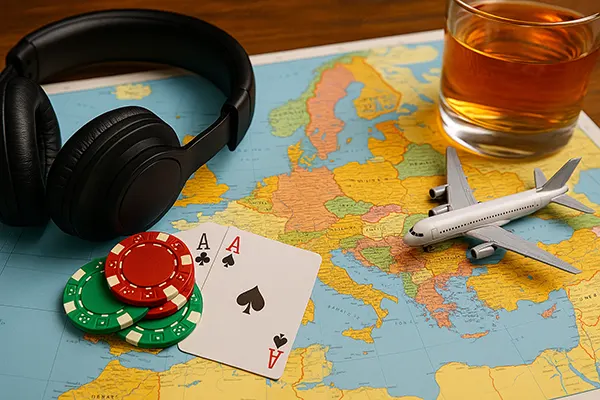
New Online Casino Licences in 2025: Jurisdictions Gaining Ground on MGA and Curacao
The regulatory landscape for online casinos is evolving swiftly in 2025, with several new jurisdictions emerging as preferred licensing authorities over traditional leaders like the Malta Gaming Authority (MGA) and Curacao. These changes are reshaping the online gambling industry, prompting operators and players to reassess the legitimacy and strategic value of licences from newer regulatory bodies.
Rising Regulatory Alternatives in 2025
In recent years, especially by February 2025, jurisdictions such as Kahnawake (Canada), Anjouan (Comoros), and the Isle of Man have significantly increased their influence in the licensing market. These regions are offering more flexible requirements and streamlined compliance protocols, attracting smaller operators and startups looking for a quicker and more affordable route into the global iGaming sector.
Kahnawake, in particular, has become a popular alternative due to its balanced approach to regulation, data protection policies, and player-centric frameworks. Moreover, its recognition in North America enhances its legitimacy for operators targeting Canadian and American players.
Meanwhile, the Isle of Man remains a premium choice for brands looking for a highly respected regulatory framework that supports international operations. Its collaboration with financial institutions and robust anti-money laundering controls continue to ensure its reputation as a secure hub for reputable online casinos.
Benefits Over Traditional Licences
One of the main advantages these new jurisdictions offer over MGA and Curacao is agility. Operators report faster licence approvals and more direct communication with regulatory bodies, reducing friction in launching new platforms or expanding into new markets.
In contrast, MGA’s increasingly stringent compliance obligations and Curacao’s ongoing restructuring have pushed some operators to look elsewhere. The time and financial cost of obtaining and maintaining an MGA licence can be prohibitive for smaller companies.
Additionally, newer jurisdictions are quicker to adopt modern technological standards, such as blockchain integrations, crypto payment regulations, and real-time KYC compliance, making them more suitable for future-ready casino platforms.
The Fall of Curacao: Reforms and Market Reaction
Curacao’s reputation, once dominant due to its easy-to-obtain licences, has been undergoing reform since 2023. The Dutch government has pushed for stricter oversight and more transparency, introducing new legislation through the Curaçao Gaming Control Board (GCB).
However, by early 2025, these reforms have not been universally welcomed. Several long-standing operators have opted not to renew their Curacao licences, citing uncertain timelines, rising operational costs, and shifting regulatory expectations as key reasons.
This regulatory tightening is part of a broader effort to align Curacao with international standards, but it has led to a temporary loss of confidence, particularly among smaller operators who once viewed Curacao as a go-to for fast market entry.
Operators’ Shift to More Transparent Markets
The retreat from Curacao has coincided with a trend towards jurisdictions that offer clearer legal protections for both businesses and players. Transparency is now a major deciding factor in licence selection, with newer authorities providing better dispute resolution processes and stricter enforcement of operator obligations.
Players are also becoming savvier, often checking the origin and reputation of a licence before signing up at a casino. Operators who fail to meet modern expectations risk not only regulatory issues but also a damaged brand image.
This change has created opportunities for up-and-coming regulators to establish themselves as trustworthy alternatives in the global gambling arena.

Jurisdictional Comparison: Legal Weight and Strategic Value
By February 2025, the perception of regulatory weight has shifted. While MGA and UKGC licences still carry significant clout in legal markets, their dominance is no longer unchallenged. Jurisdictions like Alderney, Gibraltar, and Estonia are also gaining ground through targeted reforms and pro-business regulations.
For operators targeting the European market, a licence from Estonia or the Isle of Man now provides access to most EU/EEA countries under white-label or mutual recognition agreements. This flexibility is crucial for agile marketing strategies and localisation.
Conversely, MGA’s reduced speed in licensing and rising costs have nudged many medium-sized businesses to seek equally legitimate but more accessible alternatives. Cost-efficiency, legal coverage, and a transparent tax framework are now the key competitive differentiators.
The Future of Global Licensing Trends
The online casino industry is likely to see further decentralisation of licensing power in the coming years. Operators are favouring jurisdictions that not only meet regulatory standards but also align with their commercial goals, especially in newly regulated markets in Latin America and Asia.
Innovative licensing models, such as sandbox environments and tech-focused compliance, will be a significant part of the regulatory future. Countries that embrace such innovation will likely become new hubs of online gambling entrepreneurship.
In summary, 2025 marks a turning point in the global licensing map, where flexibility, technology, and business support are replacing old notions of prestige and tradition.
